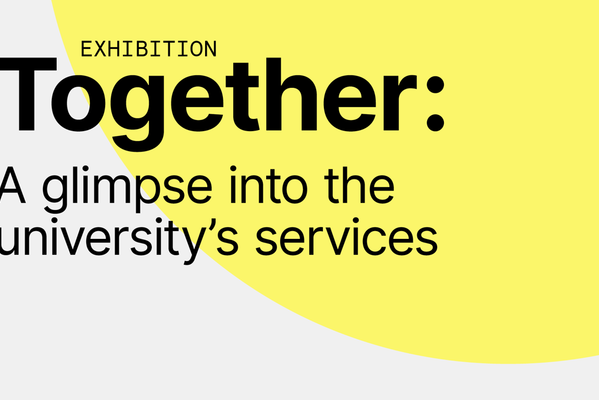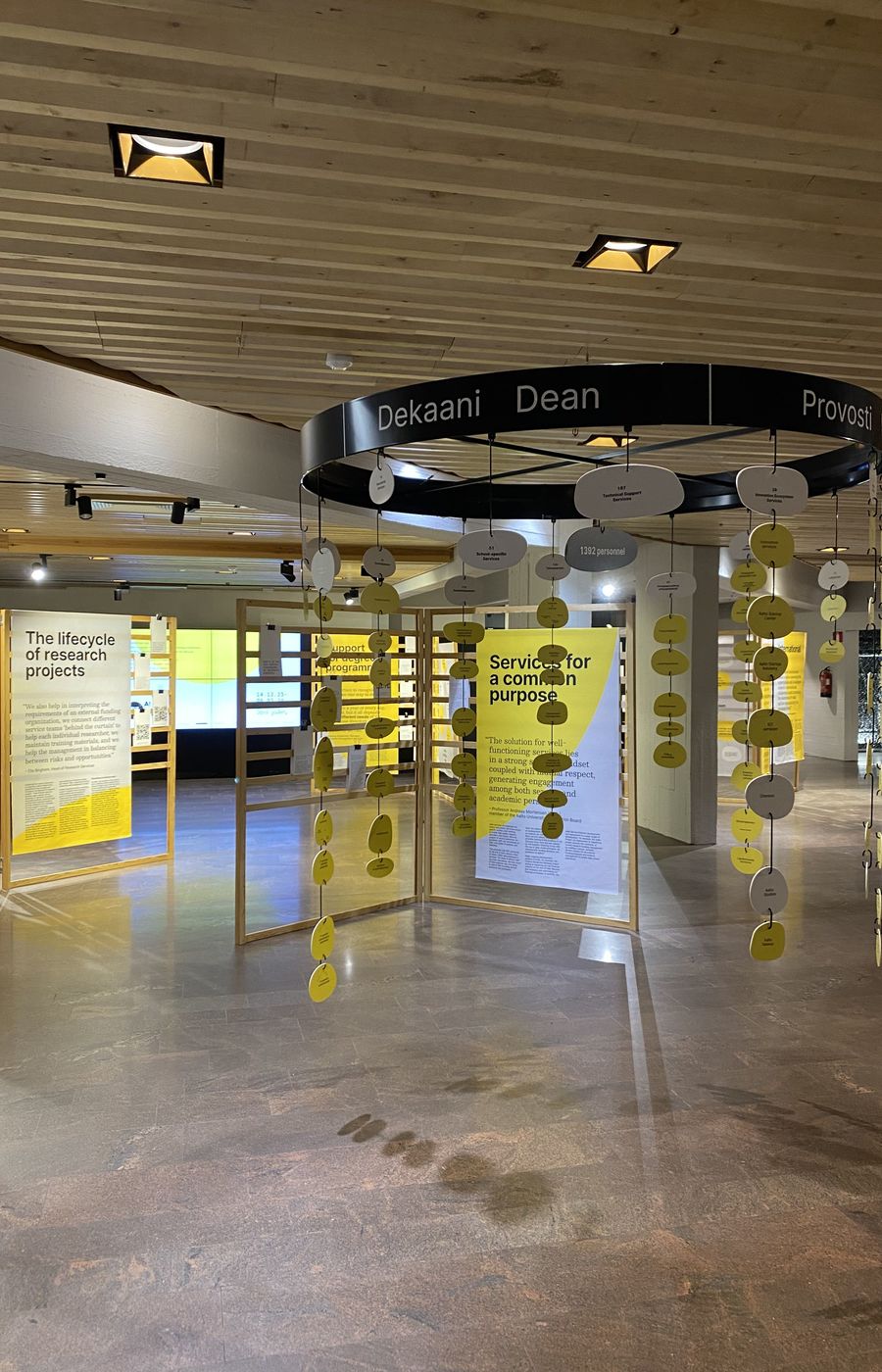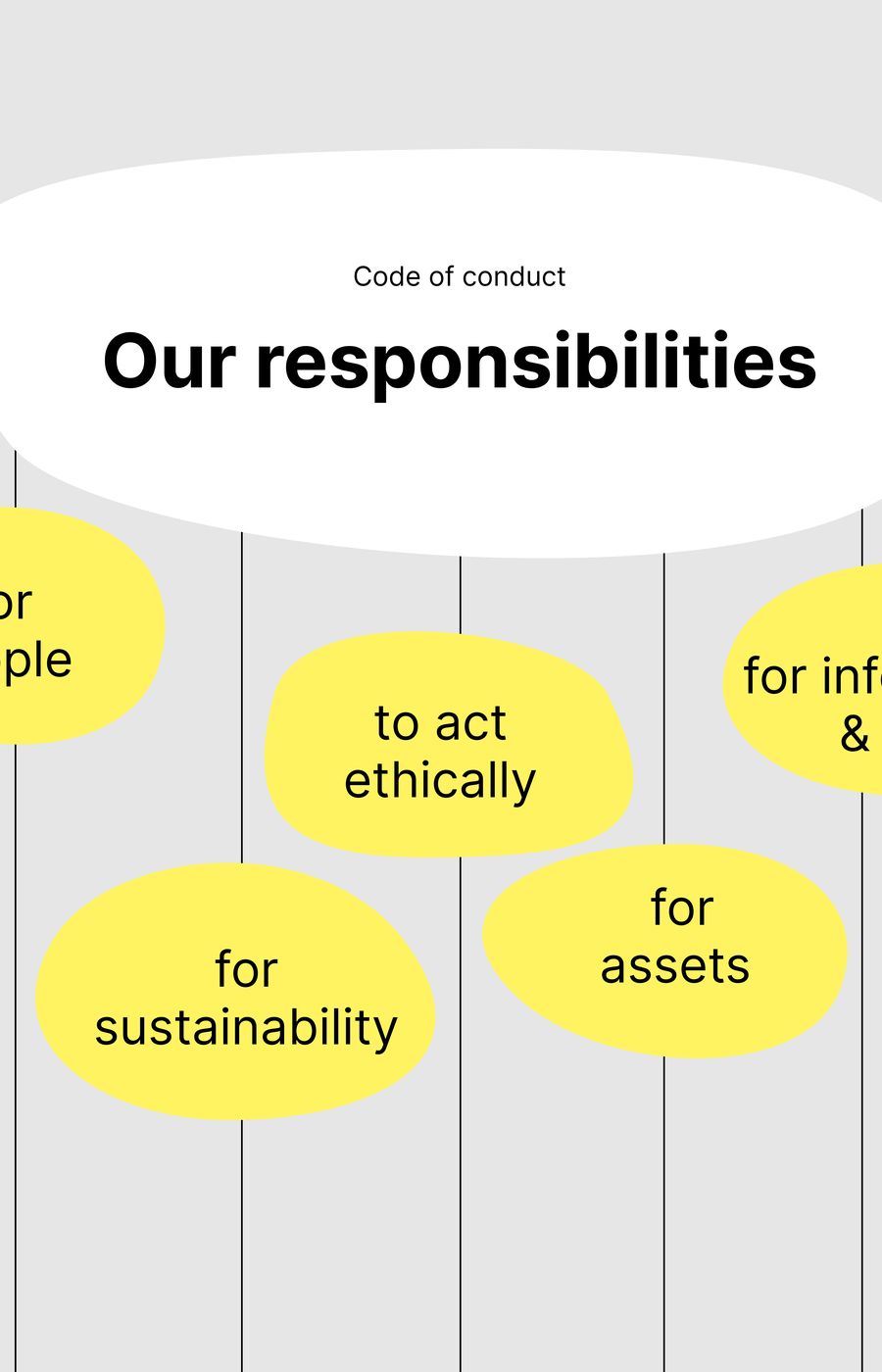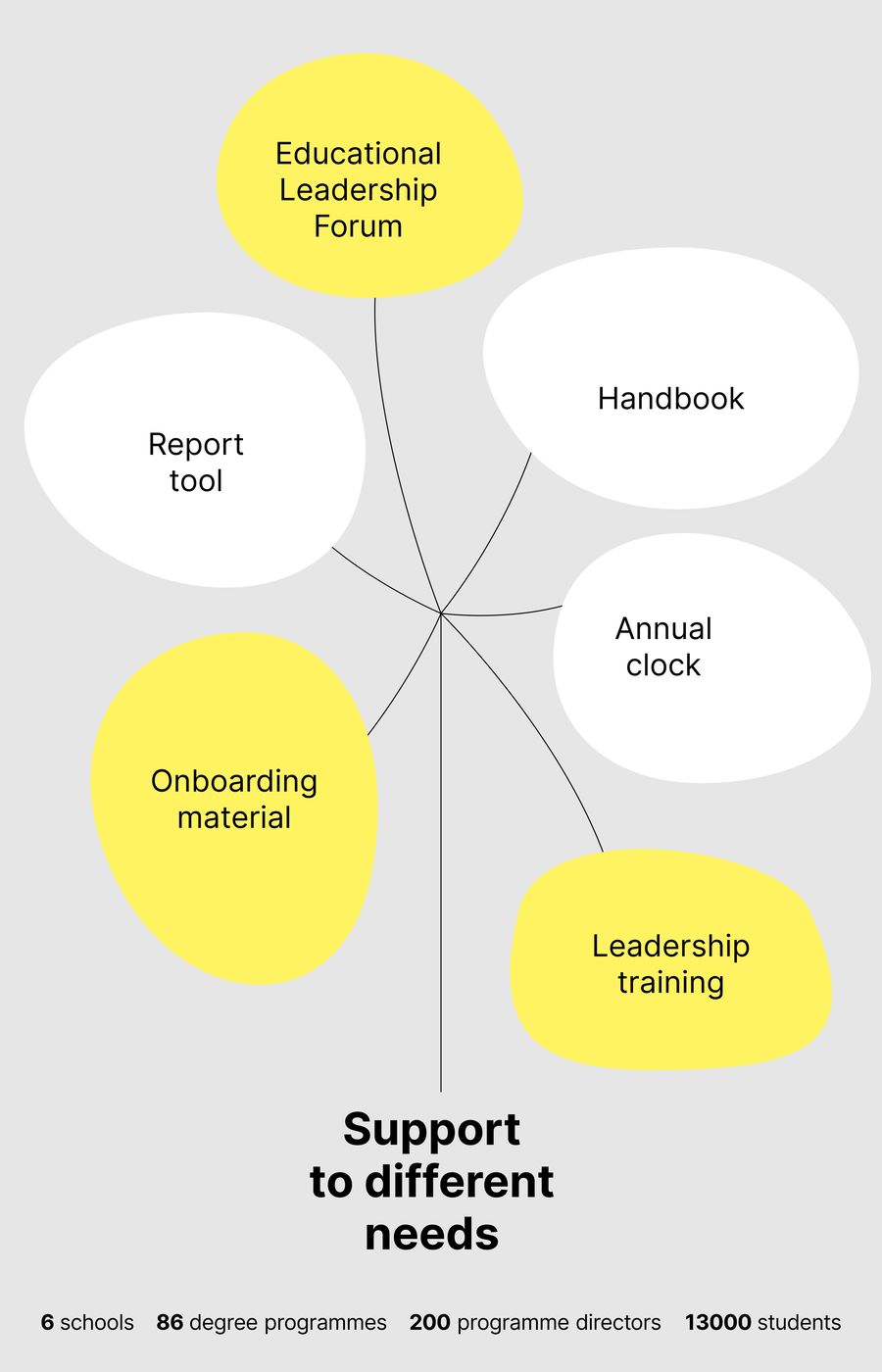
Design by Kombo and Eeva Hotta

Together: A glimpse into the University's services
Universities are institutions of research and education, continually contributing new knowledge to the world. Both within and beyond the campus, universities can also be understood as communities of people, working together to imagine new solutions to the challenges of our times.
While academic research and education are at the core of all universities, these activities are supported by a network of services, operating to maintain the structures of a functioning academic environment. Service work can take many forms with varying levels of visibility, undertaking advocacy, compliance and administrative work needed to manage internal and external factors impacting the university.
Within universities, this often leads to thinking of personnel in binaries, as either school or service staff. Yet, when we map the daily actions and interactions around research and education and the people involved, we begin to see these categories are not so distinct. In practice, there is much more connection and complexity involved in our daily work, orbiting one another in a complex system of cooperation.
Visitors of the exhibition are welcome to explore a selection of the university’s services from supporting research and education, to our values in practice, internationalisation at Aalto, and our organisational structure. Take a glimpse into the structures, connections, and community involved in supporting research and education and how they can be understood together.
Exhibition Dates: 14.12.23–08.03.24
Mon-Thu: 8:00–20:00 / Fri: 8:00–18:00 / Sat-Sun: Closed
Location: Dipoli Gallery, Otakaari 24, 02150 Espoo / Aalto University
Exhibition Working Group:
Outi Turpeinen, Manager, Public Art & Strategic Exhibitions
Mirella Lähteenmäki, Development Manager for Services
Edel O’ Reilly, Exhibition Curator
Anitta Pirnes, University Communications
Johannes Nieminen, Designer, Kombo
Animation by Eeva Hotta
Production & Printing by Novela
Printing by Sokkeli

Services for a common purpose
“The solution for well- functioning services lies in a strong service mindset coupled with mutual respect, generating engagement among both service and academic personnel”
-Professor Andreas Mortensen (EPFL), member of the Aalto University Foundation Board
Aalto services are organized into twelve centralized, and three school-specific entities, each working to enable high-quality research, education, and impact. With the support of service personnel, the academic staff can concentrate on their core duties of research and teaching.
The university had 4751 personnel at the end of 2022, almost a third of whom (1392) were employed in services. The share of service staff has been decreasing. Services’ share of total expenses was 31% being in total €119M (including service personnel and purchases). Aalto has selected seven areas of development that best drive us towards our common purpose. Most service-related development activities belong to the Enabling of our Success focus area and are steered by the Enablers Steering Group with the use of gate model principles. All development funding decisions are published at aalto.fi. Major ongoing development projects include, for example, the Finance Backbone Renewal project aiming at replacing our old financial systems at the end of their lifecycle and renewing and automating our financial processes.
In addition, the Aalto Service Platform development and deployment is a major target of development. For example, the Aalto Project List deployment to Salesforce project ensures the continuity of current research funding management by building a secure, dynamic service solution for all external funding proposals and projects management to enable data-driven operations.
Values into practice
“This is very much a team effort; many service functions – or even all – are involved in developing guidance and policies related to Code of Conduct topics”
Kristiina Kemetter, Head of Legal Services
The Aalto University Code of Conduct is one way of putting our values and way of working - the foundation of our community culture - into practice. It sets out the ethical principles and legal compliance policies that govern what we do and what we expect from each other, in all aspects of university life.Fair Play Rules: The role of compliance and ethics in our everyday work
Fair Play Rules: The role of compliance and ethics in our everyday work
First introduced in 2017 and updated in 2021, the Aalto Code of Conduct contains the ‘fair play rules’ of our university community. The diversity of talent and perspectives is one of our greatest assets. At the same time, diversity creates a need to operate with a shared culture and ethics that enable us to remain as a community with high integrity and morals.
The Code of Conduct is a collection of our most important compliance and ethics policies. Compliance means that we must adhere to the boundaries that are defined by the laws, regulations or contracts whereas ethics means that we must make choices about conduct that reflect values; ethics is about “doing the right thing”. The Code of Conduct combines both aspects.
The content of the Code of Conduct has been developed based on existing rules and guidelines, and hearing views and proposals from internal stakeholders and subject to community consultation rounds. Legal Services leads the Code of Conduct work (updates the content, when necessary, maintains content of the aalto.fi website, develops training materials, maintains ethical channel and plays usually a role when misconduct has to be investigated).
Key partners in these activities are HR and communications services. They also play a leading role in cascading Code of Conduct information throughout the community. Otherwise, it is very much a team effort: many service functions (or even all) are involved in developing guidance and policies related to Code of Conduct topics.


International Aalto
“Responsible internationalisation is about assessing the opportunities and challenges related to international collaboration and increasing the awareness of risks and the responsibility for managing them.”
-Kirsi Kettula, Head of Global Engagement
Internationalisation at Aalto
Unlike many other universities, Aalto does not have one specific International Office that would take care of international activities and services in general. “International Aalto” is integrated throughout the University’s centralised and school services. Research, education, HR, communication, innovation, and student services each serve national and international needs, with organized support for international services in each school based on their own needs and structures.
The Global Engagement team provides support for Aalto Schools and Management in the long-term development of internationalisation. The team also liaises between actors responsible for the international duties and activities of the university and acts as a point of contact for different internal and external stakeholders in international matters and key academic partnerships. Currently, questions concerning responsible internationalisation and geopolitics are increasingly common in the Global Engagement team’s everyday work.
Responsible internationalisation is about assessing the opportunities and challenges related to international collaboration and increasing the awareness of risks and the responsibility for handling them. The target is to achieve better conditions for utilising the opportunities of internationalisation in the long term. However, this work is not only concerned with controlling risks, but extends to global responsibility and sustainability, decolonizing Global North – Global South collaboration, EDI, immigrants’ paths to university studies, and educating future experts with global competencies, to name a few areas of further interest.
This work is not without its challenges, and the integration of these services may also make them less visible and more difficult to find at a school level. At the university-wide level, it can be difficult to always balance the interests and needs of an individual person, discipline or school and the interests and needs of the university as a whole.
Staff and Student Mobility
In addition to student mobility services, the HR International Mobility team is a team of five specialists that support staff in international mobility issues, including information and guidelines for incoming international staff, and working abroad. Part of this work also extends to organising events for international staff and keeping up to date with current legislation, which is continually changing, to sustain cooperation with other Universities, authorities and officials.
The lifecycle of research projects
“We also help in interpreting the requirements of an external funding organization, we connect different service teams ‘behind the curtain’ to help each individual researcher, we maintain training materials, and we help the management in balancing between risks and opportunities.”
-Ella Bingham, Head of Research Services
Support for Research Projects
Several service teams collaborate in supporting Aalto’s researchers, departments and management throughout the lifecycle of research projects. These include research services, open science, library resources, IT services, innovation ecosystem services, academic legal services and corporate relations services. Research and Innovation services support individual researchers in applying for external funding as well as finding corporate partners in collaboration with ADCO.
Most teams have dedicated personnel in each School that researchers can get to know. Once an externally funded research project has been granted, research service teams can assist in each stage of the project process, from launching and running to wrapping up. This also includes disseminating the results of the project at research.aalto.fi and open publishing of research articles and research data, supporting both the researchers and management at Aalto.
Another important service is providing support in research and innovation related policies and procedures in general through multidisciplinary collaboration both within Aalto and with external partners, library resources, open science, research assessments, research ethics and compliance. Researchers at Aalto also benefit from support in the practical aspects of securing external funding such as adhering to ethical and compliance requirements.
To respond to these needs, these services inform researchers on funding possibilities best suited to their research area and career stage as well as interpreting the requirements of external funding, connecting different service teams to individual researchers.
From library to learning centre
At Aalto, the transition of the Library into a Learning Centre started from a service design project with the focus on the students and researchers. The transformation to digital services and information resources made changes to the library building itself, when the closed collection space was replaced with open, multi-purpose space. To understand the change in scale in this process, the use of electronic resources has been increasing by 900% since 2002, with printed collections reduced by 68% since 2015. This general trend in library services moving from printed collections to electronic resources can be seen across most Universities. At Aalto, the Library developed into the Learning Centre and Service Points providing a wide range of services.


Support for degree programme management
“It's important to recognise that there is no one way to do degree programme management at Aalto. The tools we offer can be used once a year or every day, if needed, but it all depends on the different needs of the programme directors. Our role is to offer as much knowledge and support as we can.”
-Johanna Söderholm, Manager, Programme Management Services
Support for Different Needs
Aalto University Learning Services facilitate the academic progression of students and doctoral candidates from the commencement of studies to degree completion, graduation and becoming alumni. The Programme Management Services is one of the teams in Aalto Learning services offering support for degree programme directors.
There are over 70 active degree programmes at Aalto University led by over 200 programme directors and heads of majors across the six schools of Aalto. In addition to designing and implementing teaching and study modules, these academic faculty members also manage multiple aspects of the programme development from planning and delivery to assessment and reporting.
Programme Management Services is a team of diverse professionals, working across many areas to develop essential tools and help for supporting programme directors and heads of majors to deliver cutting-edge education, communication, and quality assurance for over 13 000 degree-seeking students at Aalto.
User-centric service design has a key role in the development of tools and services offered by the Programme Management Services team. As a standard, tools are produced in a user-centric way with the Aalto community, listening to the users' needs and developing services through active co-operation with a variety of internal and external working groups and stakeholders at both national and international level.